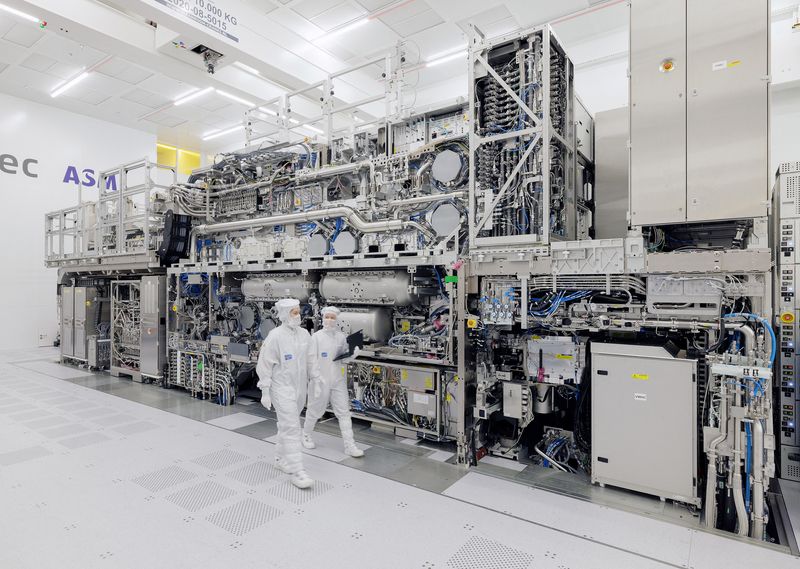Investing.com -- Shares of ASML Holding NV (AS:ASML) slid on Thursday after Morgan Stanley removed the stock from its prestigious "Top
Pick" list for European semiconductors.
At 5:42 am (0942 GMT), ASML was trading 1.6% lower at €724.30.
This downgrade, along with a revision in the company's price target, has raised concerns about ASML's near-term performance as it encounters a range of challenges in the global semiconductor sector.
Morgan Stanley’s decision came after a detailed reassessment of ASML’s growth trajectory. While the brokerahe retained an "overweight" rating for the stock, it lowered its price target to €925 rom €1,000, reflecting growing concerns about a potential slowdown in sales and profits over the next few years.
“We trim our estimates for 2025/26 given the cuts we expect as a knock-on impact from Intel (NASDAQ:INTC). All in, we trim c.€600m given such a pullback in spend at the large IDM chipmaker,” said analysts at Morgan Stanley.
This stems from expectations of lower demand for ASML’s highly advanced Low NA EUV systems, which are crucial for the production of leading-edge semiconductors.
Morgan Stanley's analysts pointed to several risks that could dampen ASML's outlook. A key concern is the projected slowdown in Intel's spending. As one of ASML's largest customers, Intel's reduced investment is likely to impact ASML's revenue growth significantly.
Additionally, while ASML's High NA EUV systems represent the next frontier in semiconductor manufacturing, there are growing concerns about the pace of their adoption.
Although Intel remains committed to these cutting-edge tools, other major industry players, such as TSMC, are expected to delay their orders for High NA systems until later in the decade. This creates uncertainty about the timing of ASML's revenue recognition from these systems, which are vital to the company’s long-term growth plans.
Another factor weighing on ASML’s outlook is its exposure to China, a critical market for the company. On one hand, ASML benefits from China’s continued investments in semiconductor capacity. However, geopolitical tensions between the U.S. and China could pose risks, particularly if further export restrictions are imposed.
Morgan Stanley flagged the potential for new U.S. regulations to impact ASML's revenue from China, specifically in its installed base management business, which provides maintenance and upgrades for its equipment.
These restrictions, combined with the broader uncertainty surrounding demand from Chinese semiconductor manufacturers, add another layer of complexity to ASML’s growth prospects.
Cyclical factors within the semiconductor industry also pose risks to ASML. The company has been a major beneficiary of booming demand for advanced chips, particularly those used in artificial intelligence (AI) and other leading-edge technologies.
However, Morgan Stanley warned that the stock remains vulnerable to shifts in market sentiment, especially as concerns grow about a potential slowdown in semiconductor demand after a period of rapid expansion. ASML, like many of its peers, could see its order volumes fluctuate as the industry adjusts to changing macroeconomic conditions.
Despite these challenges, Morgan Stanley maintains a positive outlook on ASML's long-term potential.
“We still view ASML as a high-quality name in global semis, exemplified by a growing backlog, dominance in the critical EUV lithography space and the improving dropthrough rate on additional sales,” the analysts said.
However, due to a reassessment of risks and rewards, the firm adjusted its valuation approach by applying a lower multiple to account for the company’s near-term difficulties. As a result, the price target was reduced to €925.
